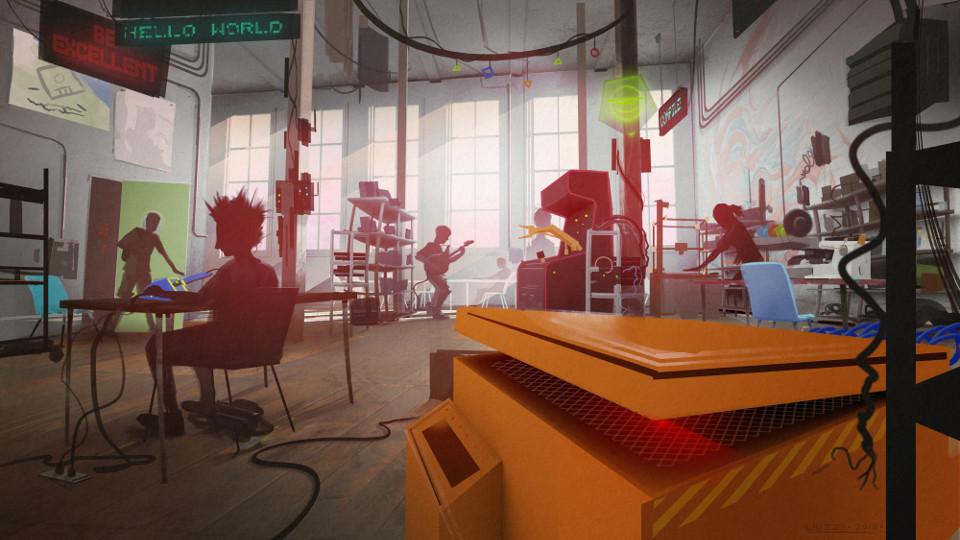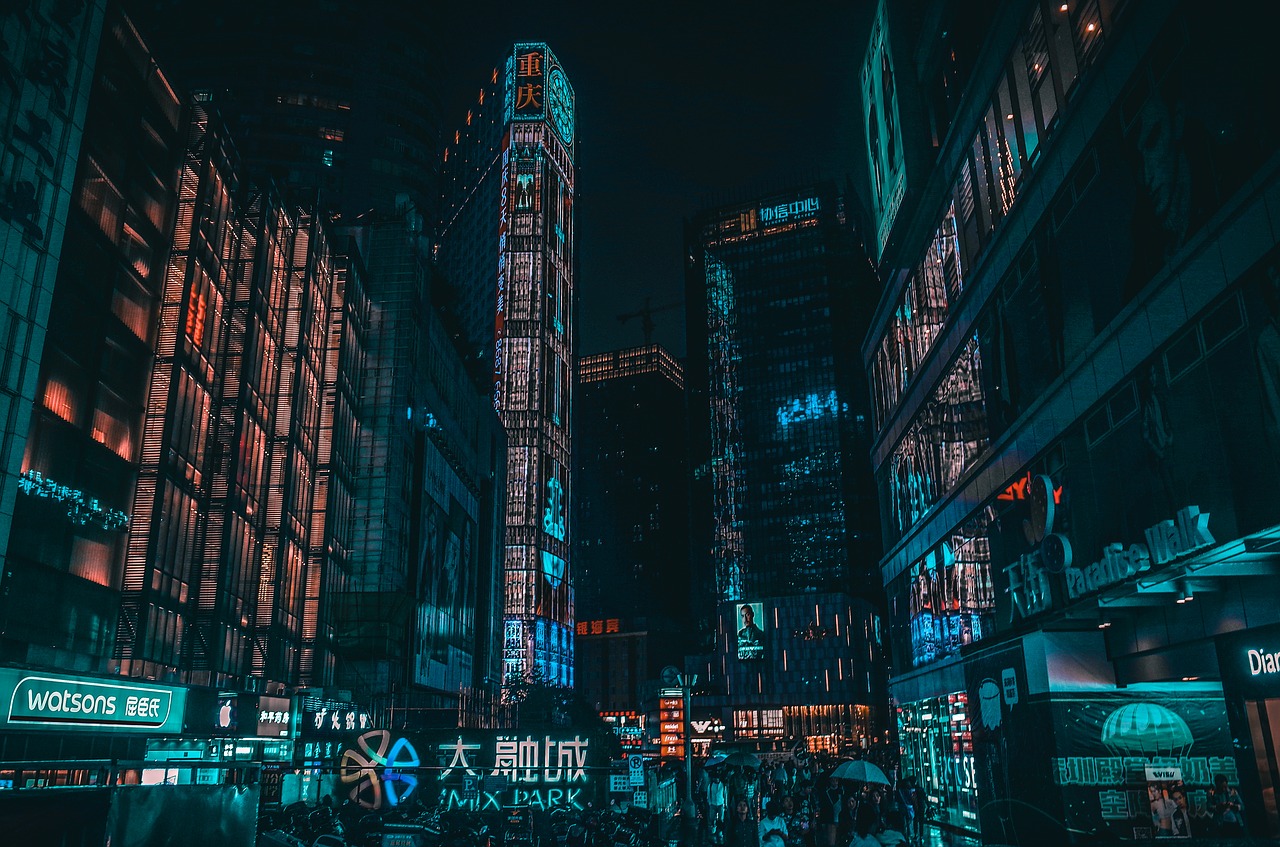Solarpunk, cyberpunk, popculture - technological narratives tl;dr
Posted on Mon 08 July 2019 in misc
This blogpost is a written version of a talk I originally was to give at re:publica 2019 in Berlin. Sadly, I couldn't attend the conference due to some health problems.
EDIT: Thanks to Artes Mobiles I had an opportunity to give this talk at 36th Chaos Communication Congress in Leipzig, Germany, in December 2019. You can find the slides at slides.com.
Several years ago I visited a hackerspace for the first time. At the time I was a Computational Neuroscience student, wanting to learn so much, but being constantly told I need to "wait out" my first few years of theoretical studies before I can lay my hands on any EEG equipment. I heard that hackers learn everything hands-on and are not limiting their curiosity. That proved true.
 Hackerspace CC-BY-SA Mike Liuzzi
Hackerspace CC-BY-SA Mike Liuzzi
I immediately fell in love with what I saw: people exploring technology not waiting for anyone's permission. If they - or their friends - had a problem, they just started looking for a way to solve it. They were able to fully dedicate themselves to their curiosities, not limited by any company or university. They shared everything they learned with each other and the world, building together instead of being afraid of anyone "stealing" their ideas.
I quickly found out it's really hard to explain it to anyone who isn't already a part of the movement. After a moment I decided to start telling accessible stories which could introduce this approach to an average person. It's not an easy task, since our culture, and especially popculture - tell us to expect something very different. The thoughts below are largely a product of the last two years of my storytelling and research.
The most important thing to note first is that the technology is complex, but its context is even more complex. There is no single person who would be able to understand and explain how a computer or a car works from the basic chemistry or physics up to the most abstract designs. To comprehend such complex systems we need to specialize and compartmentalize. Doing so means that we're losing the sight of the big picture. When working on a good compression algorithm it's really easy to forget why we actually chose to stream music over the internet instead of playing it from a phone.
Another vital point is that regular people don't study technology and only understand as much as they need to. Not everybody is a programmer or a car mechanic and such a world would be impossible. While most people may get a formal training or a friend to explain how to send emails with big attachments, they don't get the technological context the same way. It's easy to assume that "oh, it's just how it's done", but there's a lot of context education coming from the culture around us. We see stories of people using technology, fearing technology, or trying to achieve something with it - and we become accustomed to them.
 Image by Robert Pastryk from Pixabay
Image by Robert Pastryk from Pixabay
The narratives existing out in the culture are far from being objective. The most obvious culprit would be the ads and corporate language shaped to imprint some values on us. You're not a creative person, you're an apple person. There are a lot of implicit assumptions going on in there as well: by just reformulating some questions, by forgetting to mention some things, the whole message is changed. Few Big Tech companies talk about the privacy of their products. They need your data to help you, wouldn't you like the products to work better?
There are some more subtle, less obvious examples as well: we like to see each technology, invention and discovery having a single face. What takes years of research and teams of engineers, scientists, designers - it's done by Steve Jobs, isn't it? He's the visionary! Recently we saw how catastrophic results can this have with the black hole image by the New Horizons Telescope. Despite being clearly described as a team effort, a lot of media outlets decided to pick dr Katie Bauman as a face of the discovery. Her calls to feature the whole team were ignored, and the narrative unraveled into "she's worthy" vs "she's unworthy" to be a face. Because someone needs to be!
It's not surprising given what's the mythology of the modern times, well known by most of the western audiences. We love superhero stories. Stories of exceptional individuals achieving great feats on their own, without support of any communities or years of tedious work. Batman and Iron Man are not only heroes, they are genius inventors who created more technology than whole universities and corporations, while still finding time for being a vigilante.
What's even more interesting is the kind of technology they create: one-of-a-kind artifacts to be used by a hero, and almost never by the wider world. They have armors and gadgets which allow them to be effectively superhuman, but don't share them with hospitals or research agencies. They don't build infrastructure for average people to use. If anyone can be trusted with their toys, it's always the military. All this technology only preserves the status quo, makes them exceptional while keeping the world in the same state as before.
If someone else than the superheroes manages to create or repurpose some new technology to change the status quo, they're usually the villains. For some reason the superhero movies portray most of the independent technology as weapons, as if there is absolutely nothing else you can do with a power source. In "Spiderman: Homecoming" a group of workers lose their jobs because of a superhero - and steal the tech to make guns. In "Black Panther", the wonderful material - vibranium - is to be made into weapons and start a revolution. Because why would you want to stabilize the whole Subsaharan Africa's electric networks?
It's also interesting that in a lot of superhero worlds the social progress doesn't go hand in hand with technological progress. Despite being a technological utopia, Wakanda is a violent, absolute monarchy which seems to repeat all the myths about how primitive African cultures are. A similar trope is visible in Thor's Asgard and Aquaman's Atlantis. Despite having godlike technologies, most superhero nations are locked in either an individual-worshipping monarchy or a corporate capitalism spearheaded by super-oligarchs. Whoever calls for a change is a great villain for the next movie!
Being bombarded with these kinds of narratives it's not surprising that most people are more likely to believe that a single entrepreneur is more likely to advance humanity than the whole scientific community. Elon Musk has an easy job painting himself as a superhero visionary, despite being just an investor making use of years or research from NASA and other governmental agencies. We're not culturally sensitized to seeing any community as a viable protagonist in our stories.
Even when we try to stay closer to reality and imagine a world in a few dozen years, it's hard to break from the known. We already expect the technology to grow exponentially, but our social structures to stay the same or regress. That's basically the story of the most popular science fiction genre out there: cyberpunk. A world of corporations exploiting people and the planet, some exceptional individuals fighting them and failing.
 Image by Ethan Zhan from Pixabay
Image by Ethan Zhan from Pixabay
What was initially written as a warning has charmed us with its aesthetic of neon lights and shiny chrome, the promise of more power to an enhanced individual at the cost of societal cohesion. While reading and watching the stories of the heroes fighting the big bad we got accustomed to the lack of privacy (hey Siri!) and the total dissolution of worker's rights and unions (hey Uber!). Cyberpunk is not an impossible world we fantasize about, it's a perspective with which we view our own - and learn what to expect from it. The power fantasies blinded us for the warnings.
It's intriguing that the popularity of cyberpunk in the popular culture caused the word - "cyberpunk" - to replace another very important word - "futuristic". Suddenly, all over the world, in the US in Egypt, Colombia and Philippines people wish for "cyberpunk" technology. Only when faced with my total bafflement they explain that they mean the prosthetics and robots, not the surveillance capitalism and bioweapons.
The people fighting the cyberpunk dystopias are (usually violent) revolutionaries, hurting a lot of bystanders in their crusade. Even in quite realistic "Mr Robot" the protagonists didn't stop to think about the consequences of bringing down a huge banking corporation - how it will affect average people, students and families. This polarizes us and primes with expectation that people working outside of the corporate systems, building their own technologies and structures - can hurt us, the bystanders.
We already learned that a lot of real-life inventions can be inspired with science-fiction, like the tablets and Star Trek. What should interest us even more is that sometimes the narrative can distort an invention to make it more fiction-like than it needs to be. We're all so charmed by the idea of cyberpunk prosthetics that it's much easier to get a research grant and media coverage of a prosthesis than a much more needed assistive technology. No one actually asks the disabled (especially those born without a limb) if they really need a metal hand.
With our collective imagination being dominated by a vision of either a cyberpunk dystopia or a straight-out apocalypse it's hard to imagine a realistic and optimistic future. We are getting more aware of the very real threats ahead: the climate change, automation taking our jobs and losing the social cohesion required for any kind of dialogue in democracy. Can we dream up a new narrative and soak in some regenerative visions, or should we just hope for some kind of post-cyberpunk?
One such genre is being slowly born: Solarpunk. A vision of a realistic, sustainable future which deals with the problems facing us ecologically, socially and technologically. Instead of a warning - it's a promise that something can be done. It has its very own aesthetic to rival cyberpunk: green, lively cities and promenades spotted with windmills and solar panels. Stained glass windows, bicycles and flowing, colorful clothes. A world wider and more diverse than just the US, Europe and Japan.
 Gardens by the Bay CC-BY-SA Jan
Gardens by the Bay CC-BY-SA Jan
Solarpunks propose technologies which are sustainable and work within the ecosystems first. They don't need to be maximally efficient and scalable, as cyberpunks or transhumanist would want them. An ease of repair and long life of a device replace the unnecessary complexity and planned obsolescence. The recycling, and the upcycling promise a balance we haven't struck with our planet in our history so far.
What's even more interesting, the -punk is not just an anarchist scream against the establishment, but a way of creating and sharing goods and knowledge organically. Solarpunks call for a global knowledge network and local, decentralized solutions, without one mass-produced templates.
Redefining the context and the why of technology is an important part of this genre. The sustainability goes beyond just the resources and energy: Solarpunks want sustainable communities, where people are not exploited and don't burn out. Some such ideas can be seen in Cory Doctorow's "Walkaway", which portrays anarchists using programmer's tools to work together without a hierarchy. With the notions of corporations and vertical power structures being so ingrained in our culture and imagination there's still a lot to do in imagining alternatives - both societal and technological.
It's also a chance to see the world outside of the White West. Solarpunks want to acknowledge and appreciate our cultural differences, allowing us to learn from the collectives of Kenya and Indian "Jugaad" hacks. They wants a diversity of solutions instead of copying the western approach globally. Without this sovereignty of ideas Solarpunk can be as well a greenwashed imperialism, with companies claiming that "only their solar panels are green enough", totally destroying local economies and cultures.
Solarpunk exists as a perspective on our real world the same way cyberpunk does. It allows us to see more stories we haven't noticed before, from all over the planet, especially from the Global South. Right now a lot of instances of local, independent innovation, community-based solutions which don't want to scale up are ignored by the media as not fitting the narrative, the same way the assistive technologies are ignored over much more sexy prosthetics.
There's Solarpunk Manifesto (or notes towards at least) and countless real stories from around the world: Sierra Leoneans keeping their country together during an Ebola epidemic [video]. Japanese and Iraqi citizens measuring irradiation of their countries [more]. There are independent gynecological researchers working on open tests and devices for everyone.
As Solarpunk grows and becomes more defined, we will be able to notice more of those stories and talk about them without seeing them as fringe. The notions of sharing, non-commercial proactivity and sustainability will become as natural and inevitable as the global corporate capitalism is now.
